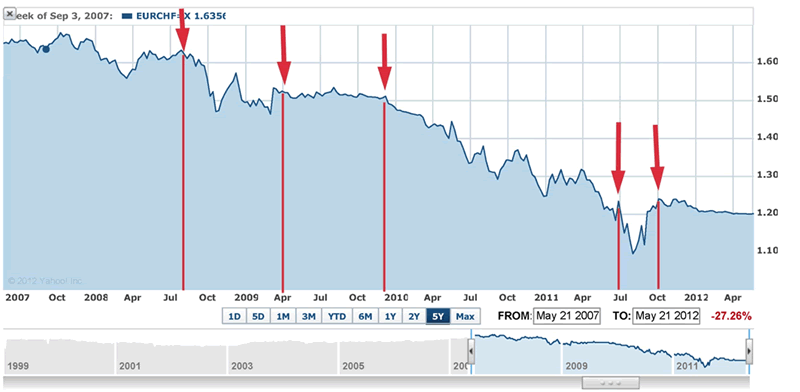Euro/Swiss Franc Exchange Rate Technical Update
Currencies / Euro May 25, 2012 - 10:08 AM GMTAs most investor are aware the Swiss National Bank put a floor of 1.20 CHF into the exchange rate in September 2011 and has stated on a couple of occasions that it will do everything to defend that level. The move was necessary in order to stop the free fall of the Euro against the CHF. Speculators trying to push it since then have been quickly caught by the Swiss National Bank since then.
Obviously this floor is extremely one-sided and sets the stage for major volatility somewhen in the future. The Euro/Swiss Franc exchange rate trades extremely close to floor of 1.20 CHF, signaling huge demand for Swiss Francs in general. There is no doubt that the Swiss national bank is losing billions of Euros by trying to maintain this floor. Speculators have taken notice and have positioned themselves for a historical record “long Euro” position.
Data shows that the number of traders long the Euro/Swiss Franc outnumber those short by a massive 44 to 1 at this time. In other words—nearly 99.5% of traders in are currently long the Euro against the Swiss Franc. How did such extreme bets play out in the past?
Take a look at the chart below. Red arrows mark similar extremes, when traders have been betting heavily against the Swiss Franc in favor of the Euro. It is quite obvious that their bets were never rewarded and ended in a financial blood bath on each occasion.

Based on historical precedence traders and investors alike would have to assume that these extreme long Euro positions are very risky to say the least. The financial markets usually do the opposite of what the vast majority of market participants expect them to do. Even if we could build a positive technical and fundamental case for the Euro (which I can’t see how at this time), the Swiss National Bank will certainly shake out all those being “long Euro” before it allows a free float again, as it always has done in the past.
What happens next?
The threat of a showdown looms dangerously large in the EUR-CHF pair and promises a great deal of volatility. At some point the Swiss national bank will allow a free float again. If this happens, investors and traders alike should be prepared for further appreciation of the Swiss Franc. The Swiss National Bank, a very powerful institution richly endowed with financial ammunition, will in its own interest most certainly not allow all those speculators being “long Euro” to get away with their profits at its expense. At this time the Swiss National Bank is unlikely to abandon the floor it imposed. It seems to me that the prudent trader should look for a different opportunity than the EUR-CHF pair, and the prudent investor should be staying in CHF or switching to CHF considering the threat of a Euro breakup. Time will tell whether this strategy proves successful.
By Volkmar Hable
volkmar@hable.ca
If you would like to send me a message please use the contact form on www.samariumgroup.com
Dr. Hable is a physicist and geoscientist by training and in addition holds a B.Sc. in Agriculture and Agronomics. In 2011 he has been appointed Consul for the Republic of Guinea.
From 1996 to the beginning of 2001, he was the CEO for a part of the European operations of Adecco, a Swiss $20 billion dollar Fortune 500 Company where he managed its offices in Europe and some parts of Asia comprising of 6,000 employees. From 2001 to 2009 he was a fund manager and asset advisor for STG Ltd, a private Swiss 700 million Euro fund focusing on energy, commodities and resources; during this time Dr. Hable managed to achieve an annual average net return of 19.8% with no down year. In December 2011 the Swiss group awarded him with the Liftetime Fund Manager Award. Previously he held senior executive positions in the oil exploration industry, the Diplomatic Corps, and a global Engineering Consulting Company.
Copyright © 2012 Dr. Volkmar “Marc“ G. Hable - All Rights Reserved Disclaimer: The above is a matter of opinion provided for general information purposes only and is not intended as investment advice. Information and analysis above are derived from sources and utilising methods believed to be reliable, but we cannot accept responsibility for any losses you may incur as a result of this analysis. Individuals should consult with their personal financial advisors.
© 2005-2022 http://www.MarketOracle.co.uk - The Market Oracle is a FREE Daily Financial Markets Analysis & Forecasting online publication.



